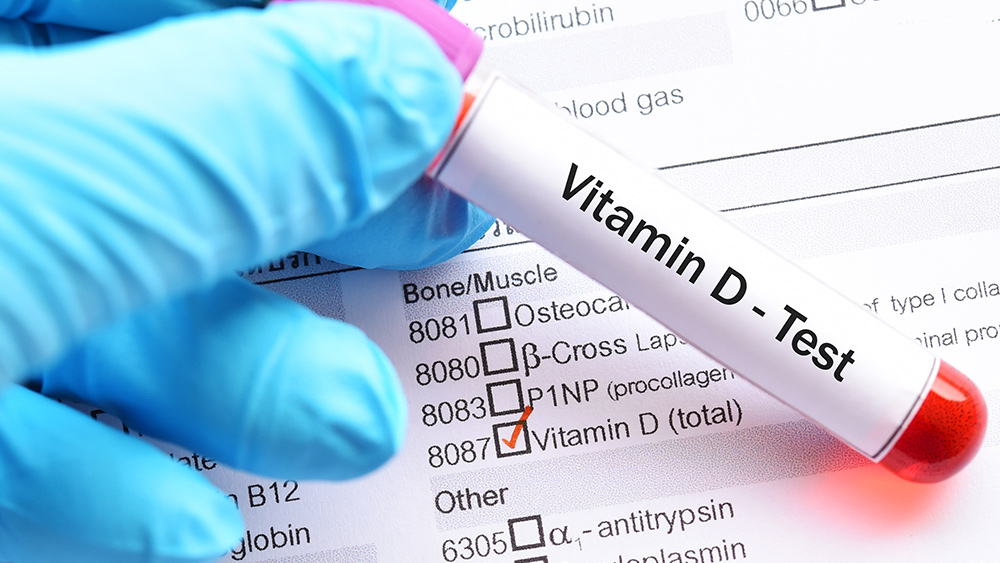10 Symptoms of vitamin D deficiency
02/02/2023 / By Olivia Cook

Here are 10 symptoms of low vitamin D levels that you need to know and watch out for:
Alopecia and hair loss
A study published in the journal Skin Pharmacology and Physiology found that women with female pattern hair loss had significantly lower levels of vitamin D (which is crucial for hair recycling and pushing the hair from its resting phase to the growing phase) than those without hair loss.
In another study published in the British Journal of Dermatology, Turkish researchers found that patients with alopecia areata had significantly lower levels of vitamin D than those without the condition.
Childhood language impairment
A study published in the journal Pediatrics found that women who had low levels of vitamin D at 18 weeks of pregnancy had nearly double the risk of having a child with signs of language impairment at ages five and 10 compared to women with higher levels.
Researchers clarified that their findings don’t prove that vitamin D causes those difficulties, but they “do highlight its importance in detail brain development” – suggesting that prenatal vitamin D supplementation may reduce the risk of developmental language problems in children.
Depression
A study published in the journal Psychiatry Research found that female college students who had low levels of vitamin D were more likely to have clinically significant symptoms of depression – eating more (or less) than usual, sleeping too much (or too little), easily agitated by inconsequential things and can’t concentrate or focus.
Eczema
A study published in the Journal of Clinical Medicine associated lower serum vitamin D levels with increased incidence and severity of eczema symptoms – patches of dry, cracked, flaky, crusty and itchy skin and rashes, which might be blotchy and bumpy.

Female incontinence
A Journal of Mid-Life Health study has demonstrated that vitamin D levels in women with pelvic floor disorders (PFD), major clinical problems in postmenopausal women, were significantly lower than in healthy women.
A study published in the journal Obstetrics and Gynecology indicated that PFD affects roughly one-third of adult women. Out of 126 postmenopausal women in the study, 44 (43.9 percent) presented stress urinary incontinence, 21 (16.6 percent) had pelvic organ prolapse and 61 (48.4 percent) had urinary incontinence plus pelvic organ prolapse.
Inflammatory bowel disease
A study published in the journal Digestive Diseases and Sciences suggested that patients with active ulcerative colitis, a type of inflammatory bowel disease, especially those who take corticosteroids, are often deficient in vitamin D.
Lupus
According to the Lupus Foundation of America, lupus (a chronic inflammatory disease in which the body’s immune system attacks its own organs and tissues) is frequently associated with vitamin D deficiency – in part “because lupus patients are often advised to stay out of the sun, and may be prescribed corticosteroids, which are also linked to low levels of vitamin D.”
Obesity
A study published in the journal Obesity Reviews indicated that obese men, women and children are 35 percent more likely to be vitamin D deficient than non-obese people and 24 percent are more likely to be vitamin D deficient than overweight people.
Researchers in a study published in the journal Cochrane Database of Systemic Reviews said the accumulation of vitamin D in the adipose tissue might explain why obese people have low vitamin D blood levels.
Tooth decay in infants and toddlers
Researchers in a study published in the journal Pediatrics found that “mothers of children with weak enamel and tooth decay had significantly lower vitamin D levels during their pregnancy compared to mothers of children with healthy teeth.”
Urinary tract infections
A study published in the International Journal of Infectious Disease found that premenopausal women who suffered from recurrent urinary tract infections had lower levels of vitamin D than women who didn’t.
Learn more about the vital role of vitamin D for optimal health at VitaminD.news.
Watch this video to learn about Dr. Sam Bailey’s eight “must know” tips about vitamin D.
This video is from the FNQ Citizen’s Collective on Brighteon.com.
More related stories:
3 key health benefits of vitamin D, the sunshine vitamin.
Can vitamin D address “occupational asthma?”
A natural treatment for PCOS: Vitamin D.
Sources include:
Submit a correction >>
Tagged Under:
autoimmune disease, Cosmetics, depression, digestive health, eczema, hair loss, IBD, incontinence, infections, language impairment, Lupus, men's health, mental health, obesity, oral health, skin health, sunshine vitamin, tooth decay, UTI, vitamin D, vitamin D deficiency, women's health
This article may contain statements that reflect the opinion of the author





















